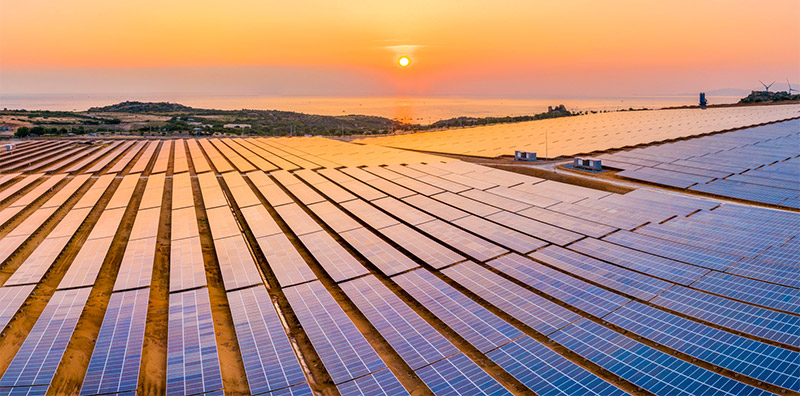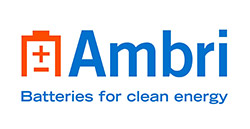shared future

We Care for a greener planet
We have committed to a Net Carbon Zero emission goal by 2035 and our New Energy proposition is key to achieving this. We are actively investing and partnering to take this forward, and building a scalable and enabling energy ecosystem.
VISION & MISSION
To build one of the world's leading New Energy and New Materials business with the aim of bridging the green energy divide in India and globally
Hyper-Integration
Integrating scientific knowledge with continuous technological innovation to build and operate truly integrated systems that deliver hyper-performance.
Robust business model
Building a model that rides the upward curve in the demand for green, clean and renewable energy in India and globally; benefits from technology superiority and downward curve in the cost of production.
Scale
Improving the efficiency, performance and life-cycle of our assets and operations to optimise total system and economics.
Full integration across the New Energy value chain
Optimum large-scale facilities that maximise benefits supported by Artificial Intelligence / Machine Learning and Robotics
Collective knowledge gained from various strategic partnerships across different verticals will help deliver the best product to the customer
Leveraging internal project execution skills and strategic partnerships to set up New Energy projects at record pace
Modular approach to dovetail and integrate new technologies
Significant captive demand for Green Energy internally within the Reliance Group

Integrated PV manufacturing from sand to PV modules including ecosystem of ancillary units

Battery chemicals and components, cells and pack manufacturing and Energy Storage system

Electrolyzer and Fuel Cell Manufacturing

Power generation for
round-the-clock power
Full integration across the
New Energy value-chain
(Photon → Electrons → Molecules)

Power generation for production of green hydrogen

Conversion of hydrogen to chemicals

Power electronics systems required to support renewable energy such as inverters, chargers, DC-DC converters

Renewable energy for mobility
- Established the Reliance New Energy Council ('NEC') with some of the finest minds globally helping us validate our strategies and embrace disruptive pathways to achieve our goals
- Commenced development of the Dhirubhai Ambani Green Energy Giga Complex ('DAGEGC') on 5,000 acres in Jamnagar which will be among the largest integrated renewable energy manufacturing facilities in the world
- MoU signed with the Government of Gujarat for a total investment of `5.95 lakh crore as part of Investment Promotion Activity for Vibrant Gujarat Summit 2022. These projects have potential to create 10 lakh direct / indirect employment opportunities in the state
- Completed acquisitions and investments of over `5,500 crore to build capabilities in New Energy
- One of the companies shortlisted under GOI's PLI schemes for integrated PV module and ACC Battery manufacturing
- Developing an ecosystem for assisting Small and Medium Enterprises (SMEs) and entrepreneurs to embrace new technologies and innovations leading to captive use of Renewable Energy and Green Hydrogen
DAGEGC development commenced
investment committed in Gujarat

Indian renewable energy sector is the fourth most attractive renewable energy market in the world. India was ranked fourth in wind power, fifth in solar power and fourth in renewable power installed capacity, as of 2020. (According to Renewable Energy Country Attractiveness index by EY.)
Demand Projection - Global
Global energy demand is likely to increase from ~1,71,000 TWh to ~1,74,000 TWh in 2040.
- Renewables are likely to replace coal (electricity) and crude oil (transportation fuels) for de-carbonisation
Crude oil demand likely to decrease by 37% from 95 mmbpd (~56,700 TWh) to 60 mmbpd (~36,000 TWh).
- As part of this, transportation fuels demand will be met by BEVs (electricity from renewables) and part by FCEVs (Hydrogen generated from renewables), impacting demand for crude oil
This is likely to result in increase in the total electricity from renewable sources.
- Renewables are likely to replace ~33,000 TWh of coal and ~20,700 TWh of crude oil demand and also fulfil incremental energy demand
- Share of renewables in energy basket is likely to increase 3.7x from ~19,200 TWh (~11%) to ~71,200 TWh (~41%)
This transition will require multi-fold increase in
installed capacity of renewable energy from the current 2,800 GW
Demand Projection - India
India’s per capita energy demand is about one-third that of the global average
As quality of life improves, India’s energy demand is likely to increase from ~12,400 TWh to ~18,000 TWh by 2040
- Coal demand is likely to decrease significantly by 54% from ~7,000 TWh to ~3,200 TWh.
- Crude oil demand is likely to decrease by 11% from 6.2 mmbpd (~3,650 TWh) to 5.5 mmbpd (~3,250 TWh)
Renewables and natural gas are likely to replace coal and crude oil and supply incremental energy demand
- Share of natural gas, in energy basket, is likely to increase from ~750 TWh (~6%) to ~3,000 TWh (~16%)
- While share of renewables, is likely to increase nearly 9x from ~900 TWh (~7%) to ~7,900 TWh (~44%)
Source: IBEF.org, bp Energy Outlook 2020

Acquired REC Solar Holdings
AS (REC Group) for an Enterprise Value of US$ 771 million
REC Group is one of the world’s leading solar cells and solar panels and polysilicon manufacturing companies.
The acquisition will help Reliance in its vision to become a global scale PV manufacturing player with industry-leading heterojunction (HJT) cell technology.

Acquired a 40% stake in Sterling & Wilson Renewable Energy
Sterling & Wilson Renewable Energy is one of the largest EPC and O&M providers globally, providing turnkey solutions in the New Energy value chain.
This move will provide further thrust to achieving Reliance’s commitment to enable up to 100 GWp of solar energy in India by 2030 and becoming a global player in the renewable industry.

Acquired Faradion Limited for an Enterprise Value of US$ 100 million
Faradion is one of the leading global battery technology companies and has competitively superior, strategic, far-reaching and extensive IP portfolios covering several aspects of sodium-ion technology.
Reliance will use Faradion’s state-of-the-art technology at its proposed fully integrated energy storage giga-factory as part of the DAGEGC project at Jamnagar, India.

Invested US$ 50 million
Ambri Inc is developing long storage battery based upon antimony calcium technology.
The investment will help Reliance commercialise and grow its long-duration energy storage systems business globally.
Along with strategic investors Paulson & Co. Inc. and Bill Gates and a few other investors, RNEL is investing a total of US$ 144 million.

Invested US$ 29 million in Germany’s NexWafe
Partnered with NexWafe for joint technology development and commercialisation of highefficiency monocrystalline “green solar wafers”.
Reliance now has access to NexWafe’s proprietary technology, which is expected to drastically lower costs and make solar photovoltaics the lowest-cost form of renewable energy available. This will help Reliance build large-scale wafer manufacturing facilities in India.

Collaboration with Denmark’s Stiesdal A/S on technology development and manufacturing of Hydrogen Electrolyzers in India
This technology can produce hydrogen at a significantly lower cost compared to current levels.
This will pave the way for rapid decarbonisation and commercialisation of affordable Green Hydrogen – a key enabler in achieving India’s green energy transition. RNEL and Stiesdal will also collaborate to develop and implement other path-breaking climate change technologies.

Invested US$ 61 million to acquire assets of Lithium Werks
An integrated portfolio of highperformance LFP solutions with a unique history of 30+ years of battery experience and innovation.
This will further strengthen Reliance’s cell chemistry technology leadership and accelerate setting up of multi gigawatt hour scale battery manufacturing in India.
* Reliance has also made other minor strategic investments in New Energy
The Reliance New Energy Council will help us validate our strategies and embrace disruptive pathways to achieve our goals. NEC members are experts at the top of their fields who will guide on technical strategy, help identify opportunities, and advice on partnerships worldwide. They are global advocates and thought leaders of the New Energy business.
NEC Charter
- Accelerate the market-led transition of Reliance to clean energy, with the aim of becoming Net Carbon Zero by 2035
- Reinvent Reliance to become a New Energy major with a focused technology roadmap of 5 to 15 years – including an optimal mix of clean, affordable energy
- Formulate strategies for business configuration, operations, models, manufacturing, project development within an ever-evolving Indian and global policy landscape
With such luminaries, Reliance hopes to transform the world and make it an even better place.
Profiles of council members

Dr. Raghunath Mashelkar (Chairman, NEC):
A pioneer of the ‘Inclusive Innovation’ movement, he is an eminent scientist, National Research Professor, and Independent Director at RIL

Dr. Alan Finkel: The former Chief Scientist of Australia, he led the development of Australia’s National Hydrogen Strategy and now serves as Special Adviser to the Australian Government on Low Emission Technologies.

Dr. David Milstein: A winner of Israel’s highest honour, the Israel Prize, he has done breakthrough research in water splitting for hydrogen, innovative energy storage systems and carbon dioxide capture and utilisation.

Dr. Geoffrey Maitland: A Professor of Energy Engineering at Imperial College, London, he is a global authority on carbon capture and storage technologies.

Mr. Henrik Stiesdal: A pioneer of the modern wind industry, he has made more than 175 inventions and received more than 650 patents related to wind power technology.

Dr. Martin Green: Referred to as the ‘father of photovoltaics’, he revolutionised the efficiency and costs of solar photovoltaics and invented PERC solar cells.

Dr. Rachid Yazami: A winner of the Draper Prize, the equivalent of a Nobel Prize for engineers, he invented the lithium graphite anode used in commercial Li-ion batteries.

Dr. Robert Armstrong: The Director of MIT’s prestigious Energy Initiative, his research links science, innovation, and policy to create pathways to a low carbon energy future.